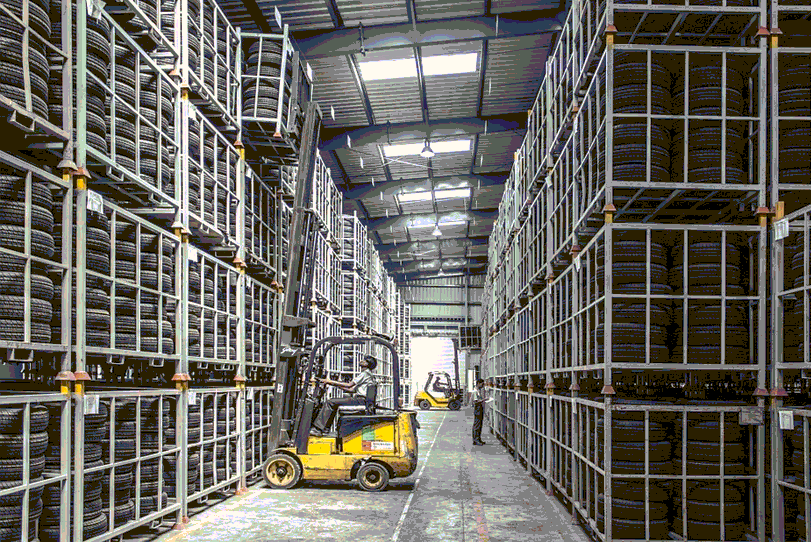Leaders from Indian warehousing and logistic sector share their views on the emerging growth opportunities for cold chain industry even in the present crisis mode that is impacting the industrial finances at large.
Indian cold chain sector poses a compelling future albeit with challenges, and is considered as unorganised, predominantly by the traditional cold storage facilities. A recent market research said that surge in ambient warehousing revenue will drive the future of Indian cold chain sector. It also hinted at demand for multi-purpose cold storage, third party temperature-controlled distribution system, regional growth and expansion.
Demand for temperature-controlled warehousing logistics
India cold chain logistics market is anticipated to register growth of more than 16 percent during 2019 – 2024, owing to growing processed food and healthcare industry. Cold chain logistics is a process which includes temperature-controlled storage and transportation of temperature-sensitive goods like food, pharmaceuticals, etc., in a supply chain. Increasing cross-border trade and growing organised retail industry is driving the Indian cold chain logistics market. Though the cold chain logistics market in India is witnessing healthy growth, high operative cost and lack of standardisation in the industry are likely to hinder the market growth during the forecast period.
According to Rohit Chaturvedi, Founder, TransportHub.com, the demand for Food and Beverages logistics has been increasing with concomitant rise of demand in temperature-controlled logistics in India. The advent of COVID -19 may also give a push to organised sector and brands with high demand for hygiene. It is evident by the fact there has been increase in in-home demand for food especially packaged food. “However, the demand for warehousing logistics may not ebb with pharmaceutical industry picking the slack left by F&B industry. It may be emphasised that the needs for pharma industry are quite different from those of F&B industry. This may mandate reconfiguration and thus investment in existing warehousing infrastructure”.
Vimal Chavda, Business Head – Instrumentation & HVACR, Testo India Pvt. Ltd. observed that awareness among the consumers regarding the food and other consumables has increased tremendously. “It is very evident that consumers not only demand the best but also want to ensure and inspect the quality of the food at every step that they wish to purchase. In such a scenario there is no scope of failure, and thus temperature controlled logistics becomes more of a necessity.”
According to Venkatesh Pendam, Vice President, Sales & Marketing, Tecumseh Products India Pvt. Ltd., “The cold chain logistics industry in India is extremely unorganised, and a substantial part of it is controlled by the unorganised companies. However, thanks to growing health consciousness and technical advances, Indian cold chain industry is increasingly heading into an integrated market framework.” Cold chain logistics are still growing in India, with the industry forecast to expand by 10-15 percent as a consequence of the COVID scenario.
According to Akash Agarwal, Director, Crystal Logistics Cool Chain ltd, the estimated annual production of fruits and vegetables in the country is about 130 million tons, which is almost 18 percent of our country’s agricultural output. Owing to diverse climate conditions and availability of better package of practices, there is a significant increase in production. “Though we have a vast scope for increased productio n, lack of cold storage facilities remains to be the primary concern while tapping the market potentials.”
Containing quality of food through warehousing logistics
It’s encouraging to see that the government has realised the significance of seamless cold chain infrastructure and focusing on policy making to catalyse the investments in the sector. The recent budget also incorporates a slew of measures to build a seamless national cold storage.
“But it may be noted that there are many factors beyond the ambit of central government which determine the developments on ground. As an example, period between harvesting and precooling is the most important duration to preserve the quality of fresh produce”, says Chaturvedi. Even a 4-5 hours of delay could cause significant damages to the produce. This crucial phase is controlled by local factors which mostly fall in state government’s purview.
To be precise, investments alone cannot change the structure of industry alone; it’s important to identify and implement required soft measure to deal with them. Importance of warehousing facility cannot be overemphasised when it is seamlessly integrated with efficient flow of goods.
Several efforts are being made to boost the agro-based transportation but those efforts will succeed only when the farm produce reaches the consumer in a wellpreserved way, says Chavda. Right from farm to fork, the food products should be of optimal quality and that’s where warehousing logistics becomes necessary. Fruits, vegetables, grains and other stuffs that have to stored temporarily must be kept in proper conditions in warehouses. Protecting the food items in the field is not enough focus should be more on the temperature and humidity control of the warehouses with logistics. This helps in reducing any sort of wastage or rejection at any step of the food distribution chain and saves a lot of money.
Tecumseh terms warehousing logistics as an important function that involves holding and preserving goods from the time they are produced until they are needed for consumption. Storing of a few items in a regulated temperature/environment is essential to maintain the freshness preserved for further consumption. “Processing the consumables at an appropriate and accurate temperature prevents the consistency of perishable and semi-perishable goods from deterioration”, Pendam adds.
“Best way to ensure the quality of the consumables is by implementing the right monitoring systems at all steps. Testo food thermometers and IR thermometers are very useful to measure the surface and core temperature of the food content and various data loggers can be used to monitor the environmental conditions of the warehouses”, Chavda adds.
Impact of COVID-19 in providing uninterrupted cold storage warehousing services
“In this pandemic, the supply chain has witnessed great amount of disruption. Although warehousing services are covered under the ambit of essentials, erratic flow of materials took the warehouses through a tough time in capacity management”, says Chaturvedi.
Cold Chain industry of India holds a huge responsibility to deal with this situation. As we are acting as one of the brave knights of our government who are shouldering the responsibilities of storing preserving delivering the essential commodities. Agarwal agrees that these are the difficult times and sustaining throughout this pandemic will be a tough task, as it will also affect the financial stability of the entire country. States have already incurred many losses during the lockdown. But with the government making cautious measures to ease the situation has brought some hope to the people to recover the losses incurred during the pandemic.
Expressing concern on preventing the consumables like F&B and pharma essentials from any infections, Chavda says “With the increasing dependency on such facilities, it’s important to take additional safety and precautionary measures followed by intense temperature monitoring. We need to ensure that proper temperature is paramount, as temperature affects the quality of food, beverages and drugs directly, and any discrepancy may lead to quality deterioration and wastage of the consumable. No doubts that all necessary measures are being taken by the cold storage services and testo extends its range of solution for quality assurance of F&B and Pharma essentials.
Our transport data loggers are used during the handling and transit of critical materials like blood and plasma. Our data monitoring systems installed in blood banks can ensure optimal environmental conditions.
Products of Tecumseh are critical to many key companies operating in the medical, scientific, food and food services markets; therefore, we remain focused on delivering important components and systems to maintain the right temperature/cooling for storage, taking into account the safety and well-being of our employees and the community. “We implement procedures to maintain the stability of our supply chain and minimise disruption to our customers. We also understand that this unexpected force majeure scenario may have an effect on business with our clients, and we are aligning our resources to provide ongoing help through this challenging time”, Pendam expressed.
Challenges faced by temperature controlled division
Apart from the existing supply chain disruptions being faced by the sector in operations, the warehousing sector may have to deal with the other unavoidable circumstances in terms of safeguarding its employees, increasing expenditure in compliance among others, says Chaturvedi.
At Crystal, we believe in the “Farm to Fork!” concept where we ensure on maintaining appropriate temperature in order to preserve the freshness of the consumable produced. Cold chain management is at a nascent stage in India, and it is expected to open up a plethora of opportunities for players having strong associations in the agriculture value chain. Significant investment opportunities are yet to be tapped in the areas of supply chain management, cold storages, financing, retailing and exports. According to Agarwal, “There must be better linkages and way of transportation between growers, storage and customers. There is absence of a single dedicated perishables gateway or fast track corridor for perishable cargoes.”
Even though the government has permitted to continue the operations, many adaptations are yet to be made in the new normal. In these times, concerns for temperature-controlled warehousing divisions could be in terms of regular and continuous environment monitoring of their facility where it becomes difficult and even risky to personally go and take the measurement reading related to temperature, humidity or other parameters. With limited resources, keeping a tap on a larger scale can be a hurdle. Considering the same, Chavda highlights about Saveris 2 Wi-Fi data loggers, Testo India’s perfect solution for such applications. “These loggers could be installed at multiple locations and its cloud based technology makes it simpler for the service owners to remotely access and analyse all measurement data.
Maintaining thermal efficiency with latest technologies
Energy efficiency is a function of efficient operations and immediate response to any exception. “Based on our experience, we have witnessed that the warehousing operations are manually driven causing very high electricity bills. Here, technology can be the key in maintaining the energy efficiency of the cold chain warehouses. IoT technology has proven to reduce the time for loading and unloading time of vehicles thereby reducing electricity bills. “Cutting edge analytics coupled with data collected through IoT devices recommends the best operational strategy which is otherwise not possible manually”, explains Chaturvedi.
Various measures are being taken to focus on ensuring the quality of the end product. “Today, precautionary and safety measures are not limited to the production level with QA & QC departments analysing the product standards. There are new norms in place to confirm the end-to-end governance for food and Pharma divisions, says Chavda. Moreover, it’s important that the producers also take the responsibility to maintain necessary standards even with their third-party CFA logistics and warehouse service providers. Proper temperature regulation at all levels is a mandate for the industry which can be easily guaranteed with the use of proper measuring equipment and smart technology.
We are investing in innovation within the areas of alternate refrigerants for the cold chain to attenuate the impact on the global climate change. Here, Pendam says, “Tecumseh is one largest producer of Condensing Units to support the cold chain from the refrigeration point of view; and we also specialise in variable speed technologies with an off-grid solution to support lastmile logistics to cold chain equipment”.
Essential commodities are products like which require temperature specific requirement like perishables of dairy, farming industries; and we at Crystal Logistics, assure for the best in it right from our state-of-the-art warehouse facility, to 3pl and 4pl, as well as have an extended arm to build up your own cold room in your premises. “With our container product superstore or blast freezer, we are trying to cater the best from our end in this situation not just from business to business option but also giving wings to new businesses by owning or renting the portable cold boxes(containers) so we as all help each other in this tough situation as together as one nation”, adds Agarwal.
The way forward
The discretionary segment for frozen or cooled F&B products might see a decline in medium term with looming uncertainty on jobs. Out-home segment of F&B (restaurants etc.) may also witness lower demand on sustainable basis even after social distancing norms are lifted.
Today, the norms have become very stringent; even the suppliers are becoming more cautious about their deliverables and given the advanced technologies that are available, data monitoring during transport is very easy and will help to shape up the F&B industry. As a matter of fact, Testo data loggers for transport applications are highly demanded instruments showcasing the need for environment-controlled logistics.
Best way to ensure the quality of the consumables is by implementing the right monitoring systems at all steps.
Vimal Chavda, Business Head –Instrumentation & HVACR, Testo India Pvt. Ltd.
This unexpected force majeure scenario may have an effect on business with our clients, and we are aligning our resources to provide incessant help in this situation.
Venkatesh Pendam, Vice President, Sales & Marketing, Tecumseh Products India Pvt. Ltd.
There must be better linkages and way of transportation between growers, storage and customers.
Akash Agarwal, Director and CEO, Crystal Logistics Cool Chain Limited
Importance of warehousing facility cannot be overemphasised when it is seamlessly integrated with efficient flow of goods.
Rohit Chaturvedi, Founder, TransportHub.com
Cookie Consent
We use cookies to personalize your experience. By continuing to visit this website you agree to our Terms & Conditions, Privacy Policy and Cookie Policy.















